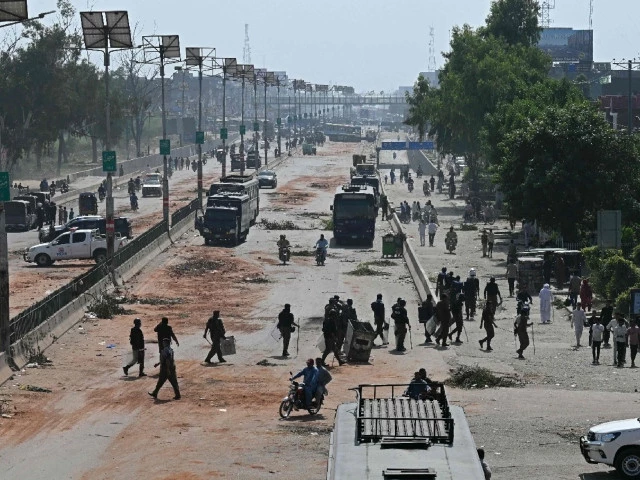How the TLP’s anti-Israel march turned into violent clashes between the religious party and the Punjab government
Police officers patrol a street following a crackdown on TLP party activists during an anti-Israel demonstration in Muridke on October 13. Photo: AFP
The Punjab government has sought the Centre’s approval to ban Tehreek-e-Labbaik Pakistan (TLP) after days of violent clashes with law enforcement agencies. The whereabouts of TLP leader Saad Rizvi are still unknown. Some say he is on the run, others suspect he has been arrested, still others believe he has fled to Kashmir. What we do know is that he was last found in Sialkot. But can a provincial government really ban a political party with sitting MPs?
Lawyer Mirza Moiz Baig said The Express PK Press Club“Although Article 17 of the Constitution guarantees the right of political association, this right is not spared and certain restrictions may be imposed on this right. One such situation in which restrictions may be imposed on the right of political association is where a political party acts in a manner prejudicial to the sovereignty or integrity of Pakistan.”
He went on to clarify that section 212 of the 2017 electoral law allows for such restrictions, but that governments can use these provisions to ostracize or marginalize their political opponents. To prevent such abuses, “Section 212 provides that the federal government may refer a reference on this matter to the Supreme Court, and the Supreme Court will then decide whether a political party has in fact acted in a manner prejudicial to state sovereignty.”
“The judgment of the Supreme Court in this regard is therefore final and binding on all parties. »
Read: Section 144 extended as Punjab govt considers banning TLP after violent protests
Banning procedure:
(1) Where the Federal Government is satisfied, on the basis of a reference from the Commission or information received from any other source, that a political party is a foreign-assisted political party or has been formed or is functioning in a manner prejudicial to the sovereignty or integrity of Pakistan or is engaged in terrorism, the Government shall, by notification in the Official Gazette, make such a declaration.
(2) Within fifteen days after the declaration provided for in paragraph (1), the Government shall submit the matter to the Supreme Court.
(3) When the Supreme Court upholds the declaration made against the political party under subsection (1), that political party shall be dissolved immediately.
According to the criterion set by article 212, we deliberate whether the previous week of demonstrations justifies a ban? Will the summary submitted by the Punjab provincial government stand up in the Supreme Court?
The unrest began after US President Donald Trump and Israeli Prime Minister Benjamin Netanyahu announced a peace plan for Gaza on September 29. This plan was subsequently ratified by several countries, including Pakistan. The deal called for an end to Israel’s two-year war on Gaza, but did not commit to Palestinian statehood, a key demand of Pakistan and much of the international community.
Dismissing the deal as “a plot to enslave Palestinians”, Rizvi announced an “Al-Aqsa to Gaza March” from Lahore to Islamabad, with the US embassy in the capital as the final destination.
Article 144 imposed a maze of roadblocks and cargo containers in two provinces, the capital, suspended mobile internet services and police personnel deployed with loaded batons, all in preparation for the TLP.
Despite restrictions, TLP workers broke through roadblocks and clashed with police in Lahore. According to authorities, dozens of police officers were injured as demonstrators, moving in small, agile groups, engaged in violent exchanges.
Learn more: Punjab govt pushes to ban right-wing TLP after Muridke clashes
Next stop, Muridke. Early in the morning, the police carried out an operation aimed at repressing TLP members. This operation cost the lives of five people – a police officer, three TLP agents and a passerby – who were accused of having opened fire on the police officers. Vehicles were on fire and the morning light was met with gunfire. More than 2,700 people have been arrested and another 2,800 placed on the exit control list.
Rumors of Rizvi’s death during Operation Muridke further fueled tensions, sparking further protests across the country. Police later confirmed he was alive and subsequent searches of his home reportedly uncovered large quantities of gold, cash and foreign currency.
The TLP, a Sunni Barelvi political-religious group founded in 2015 by the late Hussain Rizvi, is known for its populist rhetoric and violent protests. Today led by his son, Saad Rizvi, the party presents itself as the “defender of the honor of the Prophet” (PSL) and has built significant street power through repeated confrontations with the state.
Chaired by Chief Minister Maryam Nawaz Sharif, the provincial cabinet approved what it called “historic” and “extraordinary” measures, including the inclusion of the party leadership in the Fourth Schedule of Pakistan’s Anti-Terrorism Act – a list of individuals suspected of terrorism or sectarian activities. So far, 5,000 protesters have been arrested and police are searching for Saad Rizvi and his brother Anas.
The party continued to grow electorally despite its brief ban in 2021. In the last elections, it became Pakistan’s fourth-largest political party in terms of vote share, securing one seat in the Punjab Assembly.
This is neither the first nor the second protest that the TLP has inflicted on the province. Since its inception, the TLP has repeatedly mobilized on issues of religious sanctity, notably defending Mumtaz Qadri – the assassin of Punjab Governor Salmaan Taseer – and protesting against what it considers blasphemy.
And every protest brings the same type of violence, cargo container parkour, and the expectation of a ban that this time might actually become a reality.




